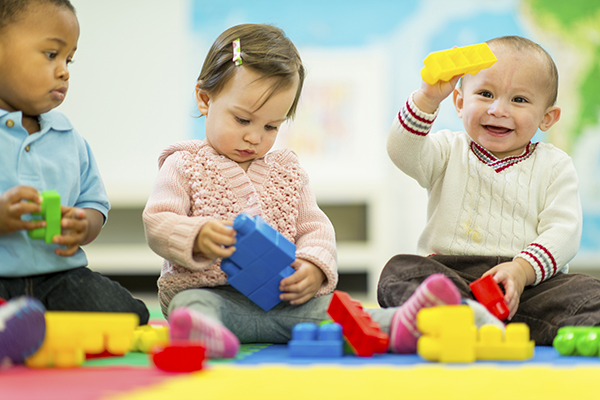When it comes to parenting or working with toddlers, it’s hard to know what normal behavior is. Toddler brains and bodies are developing at such a fast pace it can be hard to keep up! Your toddler might be able to say full sentences and communicate his or her needs, but reasoning and rationalizing isn’t a part of their skill set quite yet. It can be challenging to predict your toddler’s wants, needs and behavior in this stage of development. One thing is certain, however: Toddlerhood brings a lot of exciting new skills and challenges.
During this phase of development, it’s important to keep in mind that the determination a toddler has to learn and take in new information can be a powerful influence on behavior as well. You might hear “I do it myself!” as your developing toddler wants to feel autonomy and empowerment as they work on building new skills. Parents and caregivers might want to plan for longer and slower transitions as the developing toddler tries out his or her independence while moving from one activity, or place, to another.

High levels of activity and short attention spans are typical behavior for the ever-growing and changing toddler. Parents and caregivers are often surprised to learn that the typical toddler has a much shorter attention span than one might assume.
Average attention span for Toddlers, according to age range:
- 8-15 months: about 1 minute
- 16-19 months: 2-3 minutes
- 20-24 months: 3-6 minutes
- 24-36 months: 5-8 minutes
- 3-4 years: 8-10 minutes
The expectation for a toddler to sit and pay attention for long periods of time should be set aside while space to move and explore should be made.
Gross motor skills are coming into alignment as the younger toddler learns to walk, jump and run and the older toddler gains coordination in these skills. Plenty of safe opportunities to move and climb should be provided, including lots of outside time for toddlers of all ages.
Toddlers are also gaining the necessary social skills to build life-long relationships with family and friends. Sometimes toddlers express interest in interacting with other children in funny (and not so funny) ways. Have you ever observed a toddler walk up to a peer and bop them on the head? What adults might view as aggressive or inappropriate behavior could be interpreted as the toddler simply wanting the other child’s attention and friendship. When language is still developing, it might be challenging for toddlers to express interest in playing with other children without inserting themselves physically into another child’s world. Parents and caregivers can take these opportunities to model appropriate social interactions and open up conversations with their toddler about suitable ways to initiate friendships.
Make-believe and dramatic play blossoms at this age, too. Often children play out interests, curiosities and even fears through make-believe play. Toddlers love to imitate their caregivers and pretend to be adults. Parents and caregivers can encourage dramatic play by providing dress-up clothes and practical life materials so that toddlers can pretend to their heart’s content. Dramatic play can provide opportunities for parents to learn more about their toddlers and for toddlers to learn more about their place in the world.
The older toddler can really start to grasp story lines and related pictures, making reading and story-telling a super fun and exciting activity. Frequent visits to the library and daily reading encourage healthy development and a life-time love of reading. Toddlers often fall in love with books and ask for the same stories over and over again, sometimes even memorizing storylines so that they can “read” the stories themselves. Encourage your toddler’s interest in books by providing a wide variety of books and reading frequently. Reading aloud to your child is one of the best and most important gifts you can provide; reading offers important support in the development of social, cognitive, language and literacy skills.
The old adage, “The days are long but the years are short” can really ring true during the toddler years. Some days might feel like a futile fight just to get your toddler dressed and fed, while other days you might wonder how you were gifted with the most amazing child to ever walk this earth. Rest assured your toddler is just as confused and emotional as you might feel while parenting them. Practice patience and kindness not only with your toddler, but with yourself, as you parent. There is no one right way to parent a toddler, or a child of any age, so remember to go easy on yourself and have fun with your ever-changing and growing toddler!
